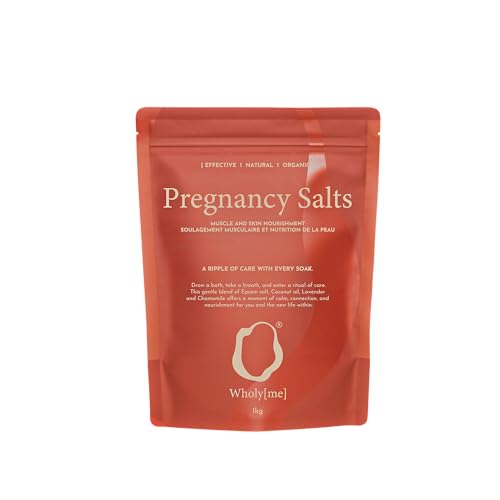During the third trimester of pregnancy, it is interesting to learn that a study showed that more than 60% of pregnant individuals experience relaxation and relief from Epsom salt baths.
But what makes Epsom salt baths specifically beneficial during the final trimester?
Let's uncover the soothing effects and practical tips for incorporating this relaxation method into your pregnancy routine.
Key Takeaways
- Epsom salt baths in the third trimester reduce swelling and muscle aches.
- They promote relaxation, aiding in better sleep and overall well-being.
- Essential oils enhance the calming effects, promoting tranquility during pregnancy.
- Safety precautions include consulting a healthcare provider, limiting bath time, and proper dilution.

WholyMe Pregnancy Bath Salts – Epsom Salt for mothers-to-be. Eases muscular tension & irritated skin. Promotes skin elasticity (anti-stretch marks). Ideal for prenatal relaxation & restful sleep – 1kg
Gentle Relief for Expecting Mothers: Designed to ease common pregnancy discomforts such as tired legs, back strain, and…
As an affiliate, we earn on qualifying purchases.
As an affiliate, we earn on qualifying purchases.
Benefits of Epsom Salt Baths in Pregnancy
When considering the benefits of Epsom salt baths in pregnancy, it becomes evident that these soothing soaks offer a multitude of advantages for expectant mothers in their third trimester. Epsom salt, known for its ability to reduce swelling, inflammation, and soothe sore muscles, can be a pregnant woman's best friend during this delicate time. The relaxation these baths provide isn't only luxurious but also essential for promoting overall well-being in the midst of the physical changes experienced in pregnancy.
In the third trimester, when discomfort can be at its peak, Epsom salt baths offer a safe and effective way to alleviate muscle aches and pains. The salts are absorbed through the skin, targeting specific areas of soreness and providing relief without the need for oral medications. Additionally, these baths can help improve circulation, reduce bloating, and aid in digestion, making them a versatile solution for the various discomforts that can arise during pregnancy.

Oilogic Roll-On Essential Oils Set for Pregnant Women – 100% Pure Essential Oil Roller for Pregnancy – Sleep, Comfort, & Wellness Blends Safe for Pregnant Moms, 0.3 Fl Oz (Pack of 3)
Maternity Must-Haves: The Oilogic Prego Solutions Set is your go-to pregnancy must have. Crafted with mamas in mind,…
As an affiliate, we earn on qualifying purchases.
As an affiliate, we earn on qualifying purchases.
Safety of Epsom Salt Baths for Pregnant Women

For pregnant women in the third trimester, it is essential to prioritize safety when considering the use of Epsom salt baths as a soothing remedy. Epsom salt baths are generally safe and can provide relief from muscle aches, swelling, and discomfort commonly experienced during this stage of pregnancy. The magnesium in Epsom salt aids in relaxation, promoting better sleep and overall well-being. However, it is important for pregnant women to consult their healthcare provider before incorporating Epsom salt baths into their routine. Following proper guidelines, such as limiting bath time and making sure the water temperature is safe, is key to having a relaxing and secure experience.
| Safety Tips for Epsom Salt Baths | |
|---|---|
| Consult healthcare provider before use | Limit bath time to 15-20 minutes |
| Ensure water temperature is not too hot | Stay hydrated before and after bath |

WholyMe Pregnancy Bath Salts – Epsom Salt for mothers-to-be. Eases muscular tension & irritated skin. Promotes skin elasticity (anti-stretch marks). Ideal for prenatal relaxation & restful sleep – 1kg
Gentle Relief for Expecting Mothers: Designed to ease common pregnancy discomforts such as tired legs, back strain, and…
As an affiliate, we earn on qualifying purchases.
As an affiliate, we earn on qualifying purchases.
Preparation Steps for Epsom Salt Bath
To prepare for an Epsom salt bath, start by filling your bathtub with warm water that's both comfortable and safe for pregnancy. Here are the steps to create the perfect Epsom salt bath experience:
- Add 2 cups of Epsom salt: Pour the Epsom salt into the bathwater and allow it to dissolve completely before stepping in.
- Soak for 12-15 minutes: Relax in the Epsom salt bath for the recommended time to experience muscle relaxation and pain relief, ideal for the discomforts of the third trimester.
- Consider additional ingredients: Enhance your bath by adding baking soda for further relaxation or essential oils for specific benefits like soothing lavender or invigorating citrus.
- Rinse off gently: After soaking, rinse off with clean water to remove any residue from your skin and pat dry gently for a soothing end to your Epsom salt bath ritual.

Aromasong Dead Sea Pregnancy Bath Soak 5 LB – Unscented Pure Magnesium Flakes & Minerals – Pregnancy & Postpartum Muscle Aches & Leg Discomfort – Better Absorbs Than Epsom Salt (Packaging May Vary)
SOOTHING PREGNANCY SOAK – Pregnancy can put stress on the body, Our bath salts will soothes your body,…
As an affiliate, we earn on qualifying purchases.
As an affiliate, we earn on qualifying purchases.
Mixing Essential Oils With Epsom Salt

Mixing essential oils with Epsom salt can enhance the soothing and calming effects of your bath during the third trimester of pregnancy. When selecting essential oils for your Epsom salt bath, opt for pregnancy-safe options such as lavender, chamomile, or citrus oils known for their relaxation properties. To create a blissful blend, simply add a few drops of your chosen essential oil to the Epsom salt before incorporating it into your bathwater. This combination can help alleviate the aches and stresses commonly experienced during the third trimester, promoting a sense of tranquility and well-being.
Here is a helpful table to guide you in choosing the right essential oil for your Epsom salt bath:
| Essential Oil | Benefits |
|---|---|
| Lavender | Calming, aids in better sleep |
| Chamomile | Soothes muscles, reduces anxiety |
| Citrus Oils | Uplifting, energizing |
Precautions for Epsom Salt Baths in Pregnancy
Taking a warm Epsom salt bath during pregnancy requires careful consideration and attention to safety measures to guarantee a relaxing and beneficial experience for both mother and baby. When indulging in these baths, pregnant women should follow these precautions for safe use:
- Consult Healthcare Provider: Before taking Epsom salt baths in the third trimester, it's essential to consult with a healthcare provider to verify it's safe for both you and your baby.
- Limit Bath Time: To prevent overheating during pregnancy, it's recommended to limit your Epsom salt bath time to 12-15 minutes.
- Proper Dilution: Ensure proper dilution of Epsom salt in warm water before taking baths to experience its benefits effectively and safely.
- Avoid Ingesting: While enjoying the relaxing soak, remember to avoid ingesting Epsom salt and adhere to recommended guidelines for a soothing experience in the third trimester.
Frequently Asked Questions
Can You Sit in an Epsom Salt Bath While Pregnant?
Yes, we can sit in an Epsom salt bath while pregnant. It helps reduce swelling and muscle aches, providing relaxation. Absorbing magnesium through the skin can benefit pregnant women. It's safe with proper precautions.
How Do You Relax With Epsom Salt Bath?
To relax with an Epsom salt bath, we add 2 cups of salt to warm water and soak for 12-15 minutes. This helps with muscle relaxation, pain relief, swelling reduction, and inflammation. Consult your healthcare provider for safety during pregnancy.
How Do You Relax a Bath While Pregnant?
We relax in a bath while pregnant by creating a soothing environment, focusing on self-care. It's important to take time to unwind, relieve muscle tension, and promote well-being. A warm Epsom salt bath can work wonders during this special time.
How Long to Soak in Epsom Salt for Anxiety?
We soak in Epsom salt for anxiety relief typically for 12-15 minutes. The magnesium helps relax muscles and calm our nerves, aiding in stress reduction. Consistent baths can improve our mental well-being, creating a soothing environment for anxiety alleviation.
Conclusion
To sum up, Epsom salt baths can be a safe and relaxing way to alleviate the discomforts of pregnancy during the third trimester. Remember to always consult with your healthcare provider before starting any new regimen.
One example is Jessica, who found relief from her back pain and stress by incorporating Epsom salt baths into her routine, allowing her to enjoy a more restful and comfortable pregnancy experience.
Take care of yourself and prioritize your well-being during this special time.









